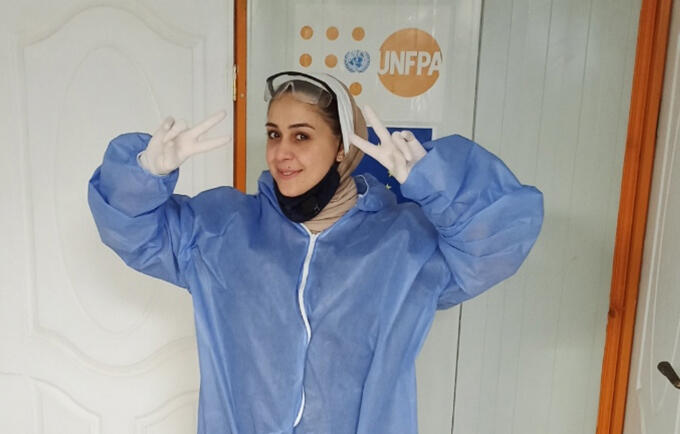Not so long ago, my alarm would go off every morning at 5:30 am, I would get dressed and by the time I got ready, the sun was up, and so were my three little ones, who would be standing by the door for their daily dose of hugs and kisses. I leave home and head to the UNFPA-supported reproductive health clinic at Zaatari Camp. It’s a 90-minute drive, but I like to think of it as a form of meditation. As I arrive to the clinic to assume my duties as a gynecologist, I’m always greeted by the lovely nurses and dedicated midwives, while the children accompanying their mothers are running around in the waiting area. My 8-hour shift is distributed between examining patients, delivering babies, and checking on the mothers and their newborns; I spend another hour and a half on the road before entering my sweet home and see my children whom I’ve missed so much. This scene is probably mundane but it’s very dear to my heart. However, things took a drastic turn when the threat of the coronavirus became real. Our midwives would tirelessly conduct back-to-back awareness sessions to educate patients about this disease, how quickly it could transmit from one person to another sparing no one if precautions were not taken seriously. Before long, the Jordanian government announced a curfew, limiting the movement of people in non-vital sectors, and prohibiting transportation among governorates. Nonetheless, I was asked to be the on-call doctor at the clinic for 72 hours instead of my normal 8-hour shift. My commute was stopped by numerous checkpoints, which I had to flash my badge at each and every one of them. When I finally arrived, the place looked different, so quiet that you could hear a pin drop, everyone was keeping a safe distance from each other, and children’s laughter were substituted by the silence of uncertainty. I was given a personal protective equipment (PPE) that I changed into to protect myself and others.
As a frontline health worker, I am at a higher risk of contracting the virus since I am dealing with dozens of people daily. As preventive measure number of staff working at the clinic is halved my team and I are now working twice as hard to compensate for the missing staff members. We are working round the clock to ensure the delivery of quality necessary reproductive and family planning services that are critical as they tend to be overlook in times of crisis. It is not easy to act strong when you know your enemy is cunning, but it’s an oath that I have taken upon myself to care for my patients who see the world through my eyes. It’s already 9:00 am, time to handle my patients to the next shift after working continuously for 72 hours. I am so exhausted, thinking of going home when a first-time mother that I had delivered a few hours ago said to me “It is the little things that matter the most.. you and the rest have done so many little things for me. It shows how much you and your staff care about patients. I’m so grateful”. The way home seemed longer than usual, with more checkpoints to go through. Eventually, I got home, I could hear my kids racing who would get the door first to hug me after a long shift. “Mommy is here, I miss you all, but I can’t hug you now, I need to sanitize myself first” I explained. The door opened and they lined up behind their father, asking if I was contagious. Oh COVID-19, you killed those precious moments! Because I am a frontliner, I cannot be around my kids without a mask, as a protective measure. More so, I maintain at least a one-meter distance between us at all times. No hugs. No cuddles. No kisses.
The sun is up, it’s a new day, the alarm sounds at 5:30, I get ready but this time, I wave goodbye at my children from afar. I come to the clinic to ensure the continuity of our reproductive health services at the most difficult of times. I admit I do have worries sometimes, but when I look into the eyes of every healthy baby I deliver, my doubts dissipate and I get a burst of hope and strength that make me believe we are going to get over this and return to our normal lives.
Much love,
Dr. Eman*
*JHASI Gynecologist, working at the UNFPA-supported reproductive clinic in Zaatari Camp since April 2018.
Jordan Health Aid Society International (JHASI) is the national implementing partner of UNFPA/ Jordan for sexual and reproductive health sustainment at Zaatari Camp's Reproductive Health Clinic. EU ECHO is the kind donor that supports the Clinic as well as the Women & Girls Safe Space in Zaatari Camp.


